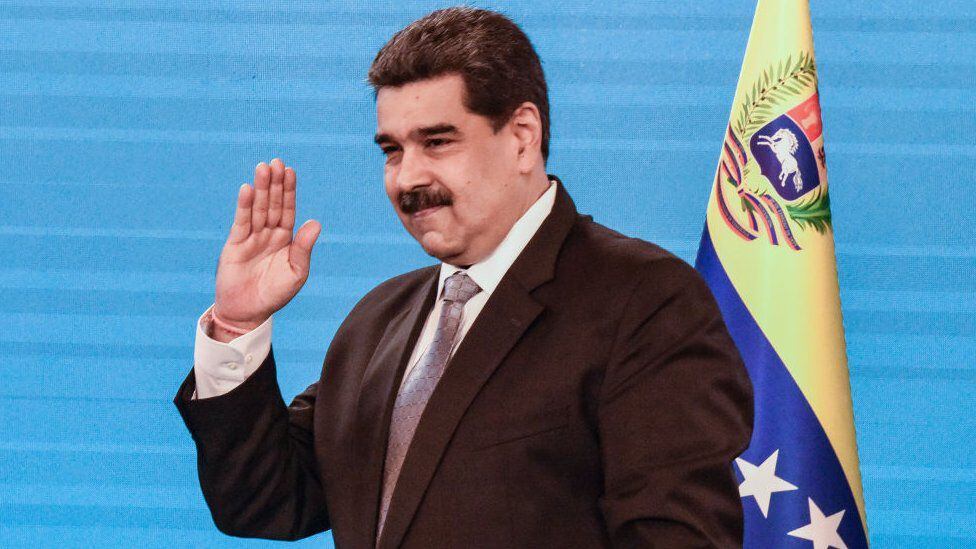The National Assembly of Venezuela elected in 2015 has appointed a new board, officially ending the era of Juan Guaido.
The so-called opposition Assembly, which exists in parallel to the pro-government Assembly, appointed this Thursday as its new president the former deputy Dinorah Figuera of the Primero Justicia political party, who will hold office from Spain, where she lives in exile.
Look: The US still considers Maduro “illegitimate” after dissolution of the interim government of Venezuela
Last week, the Venezuelan opposition ousted Juan Guaidó, who had been the leading figure in Venezuela’s fractured opposition since 2019, and eliminated the “interim government” after calling President Nicolás Maduro’s 2018 re-election fraudulent.
The United States and other Western governments had endorsed Guaidó as “interim president.”
“Today I assume the Presidency of the legitimate AN, a path that demands to be traveled in unity, where the social and human rights of all Venezuelans in a depressed Venezuela will be a main bastion and the relentless fight for freedom our north,” Figuera tweeted shortly after his appointment.
But, who is the new president of the opposition National Assembly and what will her job be?
From humble origins to the Assembly
Dinorah Figuera was a student leader at the Central University of Venezuela (UCV), where she graduated in 1991 as a surgeon.
Between 1993 and 1996, as member of the Radical Cause party who is now disabled, was undersecretary of the Libertador de Caracas Municipality, during the administration of Aristóbulo Istúriz, who was a great political figure during the governments of Hugo Chávez and Nicolás Maduro.
Raised in a poor neighborhood in western Caracas and a cancer survivor, Figuera is deputy secretary general of the Primero Justicia opposition party and has a much lower profile than her predecessor, Juan Guaidó.
“Who would have believed that this woman who comes from Catia, who has fought, who has accompanied the guilds today is going to to preside over such an important Parliament?” Said the woman from Caracas on Twitter.
Figuera was elected deputy for Caracas for the period 2010-2015 and for the state of Aragua, in the center-north of the country, in 2015.
In January 2021, she was appointed president of the Technology and Innovation commission of the Assembly.
Today with 61 years lives in the Spanish city of Valencia, where he is dedicated to caring for the elderly due to his inability to practice as a doctor in the European country.
An Assembly led by women
The former deputy is not the only leader who will legislate from exile.
In fact, Marianela Fernández, from the Un Nuevo Tiempo party, and Auristela Vásquez, from Acción Democrática, were designated as first and second vice president of the opposition Assembly, respectively, and also live abroad.
According to Venezuelan media, one of the main tasks of the board in exile will be to appoint the Commission for the Protection of Assets, decide the renewal or ratification of the board ad hoc of PDVSA Holding and that of the BCV (Central Bank of Venezuela), which are facing legal proceedings in the United States and the United Kingdom, respectively.
“We received a National Assembly with a diatribe and conflict. I come from having recovered my health after a very aggressive cancer. I have testified to being a brave woman who works in unity,” Figuera said in her first statements after being appointed as president of the opposition parliament for the 2023-2024 period.

“All of us who are here have to bet on unity for Venezuela and for democracy,” he added.
Before leaving the country, Figuera assures that she was harassed by Sebinthe intelligence agency of the Venezuelan government.
“Very often, I had Sebin in front of my house, they came to put two Army tanks and I was always the object of persecution and aggression by groups,” he says in a story published on the National Assembly website.
“I received death threats all the time (…) One day, I received an urgent call from a fellow deputy who told me to leave immediately for an embassy, because Sebin was looking for me.”
He affirms that he had to hide in the French Embassy in Caracas with his daughter for about 10 days until he was able to leave Venezuela.
“Our fight is not for a charge”
The elimination of the “interim government” of Juan Guaidó last December was approved with 72 votes in favour, 29 against and 8 abstentions of former opposition deputies.
The decision dismantled the strategy supported by the United States and most Latin American and European countries for the last four years to promote the departure of President Nicolás Maduro, and began a new stage with the 2024 presidential elections on the horizon.
Guaidó proclaimed himself interim president of Venezuela in January 2019, after disregarding the legitimacy of the May 2018 elections in which Maduro was elected for a second term.
This Thursday, the opposition leader said goodbye to the position of “interim president” reproaching the elimination of this figure and the lack of unity of the opposition.

“Our fight is not for a position,” said Guaidó, denouncing that his opposition comrades had “hit the Constitution to the side” by abolishing the figure of the interim president.
“You cannot leave a power vacuum,” he insisted.
The Venezuelan opposition plans to organize this year a primary selectionsfrom which the candidate who will face Chavismo in the 2024 presidential elections must come out.
But a few months before the elections, some analysts believe it is very likely that the opposition will arrive fractured, which would benefit the government of Nicolás Maduro.
After his election to the command of a National Assembly elected eight years ago, Figuera will have an even more difficult mission: trying to unite the Venezuelan opposition before the primaries.
Source: Elcomercio
I am Jack Morton and I work in 24 News Recorder. I mostly cover world news and I have also authored 24 news recorder. I find this work highly interesting and it allows me to keep up with current events happening around the world.

:quality(75)/cloudfront-us-east-1.images.arcpublishing.com/elcomercio/GE4DCNZNGAYS2MBWKQYDAORRHA.jpg)

:quality(75)/cloudfront-us-east-1.images.arcpublishing.com/elcomercio/6RXJ557WFRAPTLWWMV3EPDQWBQ.jpg)
:quality(75)/cloudfront-us-east-1.images.arcpublishing.com/elcomercio/5GXSVTGF6BFWTLZUJIDSGEKHHQ.jpg)
:quality(75)/cloudfront-us-east-1.images.arcpublishing.com/elcomercio/7UP36SD2RFFVXP6J2Q274SPQNE.jpg)
:quality(75)/cloudfront-us-east-1.images.arcpublishing.com/elcomercio/VNKVF3HCAJCZTCBTQGMOOLZNM4.jpg)
